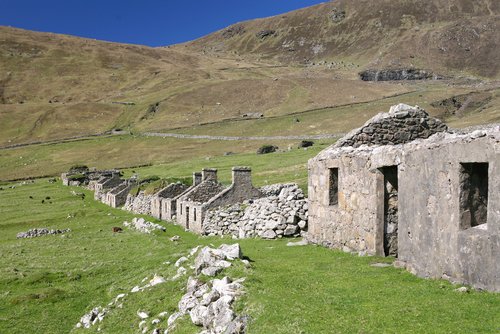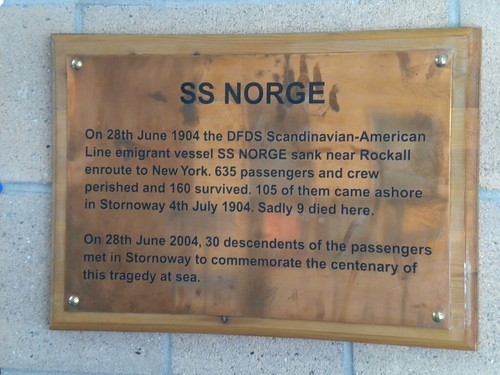William Scambler was a 30-year old trimmer / cook on board His Majesty's Trawler "THOMAS STRATTEN", when this ship hit a mine off the Butt of Lewis on 20 October 1917. William's remains were buried at Sandwick Cemetery near Stornoway. Today, I managed to track down records of his birth and his death, which paints the following picture.
William Scambler
Birth record
Date of birth: July 23rd, 1887, 5h AM
Place of birth: Glorat, Campsie, Stirlingshire
Name of father: James Scambler, assistant gamekeeper (present at registry office)
Name of mother: Elizabeth Harriet Scambler, nee Dryden
Place and date of their marriage: Edinburgh, 14 October 1886.
Death record
Name: SCAMBLER, William
Rating: Trimmer / Cook
Official no and port division: 712.T.C. (Po)
Branch of service: R.N.R.
Ship or unit: H.M. Trawler "THOMAS STRATTEN"
Date and place of birth: 23.7.1887, Lennoxtown, Stirling
Date of death: 20.10.1917
Name and address of cemetery: Civil Cemetery, Sandwick, Stornoway, Isle of Lewis, grave O. 1321.
Relatives notified and their address: Wife, Alice; Branxton, Innerwick, Berwick, Scotland
Among
William's shipmates, none of whom were recovered were (further details courtesy
CWGC)
BOWSER, Walter, Trimmer, RNR, TS 6310 (aged 18), Son of Thomas Frederick and Lilian Bowser, of 42, Beecroft St., St. George's Rd., Hull. Remembered on Chatham Naval Memorial panel 27
BROWN, Charles John, Deck Hand, RNR, DA 5540 (aged 24). Son of Alice Mary Brown, of Clare Cottage, Caister-on-Sea, Great Yarmouth, and the late Charles John Brown. Remembered on Chatham
Naval Memorial panel 26.
COLLINSON, James, Deck Hand, RNR, SD 3895 (aged 21). Son of George Collinson, of 158, High St., East End, Sunderland, and the late Catherine Collinson; husband of Catherine Millar (formerly Collinson), of 58, Loudoun Square, Cardiff. Remembered on Chatham Naval Memorial panel 26.
PARRISH, Charles, Ordinary Telegraphist, RNVR, Tyneside Z 10209 (aged 20). Son of Willie and Amanda Matilda Parrish, of 75, Carr House Rd., Shelf, Halifax. Remembered on Chatham Naval Memorial panel 27
PIRIE, James, Deck Hand, RNR, DA 3948. Remembered on Chatham Naval Memorial panel 28
PLAYFORD, John, Deck Hand, RNR, DA 10703 (aged 26). Son of Sarah Ann Playford, of Pockthorpe, Raveningham, Norwich. Remembered on Chatham Naval Memorial, panel 26.
POLLARD, Thomas Edward, Deck Hand, RNR, DA 12923. Son of Fanny Pollard, of Gorran Haven, Gorran, Cornwall. Remembered on Plymouth Naval Memorial, panel 24.

 Not all eight of the lifeboats launched from the Norge stayed afloat; some sank at the moment of launch, but a handful were spotted by fishermen and taken to the United Kingdom. One lot of survivors was put ashore at Stornoway, and treated at the local hospital. Nine succumbed to their ordeal and lie buried at Sandwick Cemetery, a 15-minute walk from my position. One boat is thought to have drifted northeast to and beyond the Arctic Circle; but there is no confirmation of her fate.
Not all eight of the lifeboats launched from the Norge stayed afloat; some sank at the moment of launch, but a handful were spotted by fishermen and taken to the United Kingdom. One lot of survivors was put ashore at Stornoway, and treated at the local hospital. Nine succumbed to their ordeal and lie buried at Sandwick Cemetery, a 15-minute walk from my position. One boat is thought to have drifted northeast to and beyond the Arctic Circle; but there is no confirmation of her fate.  Nobody has heard of the Norge. No rich and famous on board that ship. Just dirt poor emigrants from Norway, Denmark, Sweden and Russia. In particular the Russian emigrants were the undesirables of that country. Jews, who had been packed away onto the western fringes of the Tsarist realm, and generally hated and detested in many circles of the Russia of 1904. The board of inquiry into the sinking of the Norge found that there were insufficient lifeboats for the number of people on board. A recommendation was issued that laws should be introduced, requiring ships to carry sufficient lifeboats, -rafts and other craft to accommodate all on board in the event of abandon-ship. This was not followed through.
Nobody has heard of the Norge. No rich and famous on board that ship. Just dirt poor emigrants from Norway, Denmark, Sweden and Russia. In particular the Russian emigrants were the undesirables of that country. Jews, who had been packed away onto the western fringes of the Tsarist realm, and generally hated and detested in many circles of the Russia of 1904. The board of inquiry into the sinking of the Norge found that there were insufficient lifeboats for the number of people on board. A recommendation was issued that laws should be introduced, requiring ships to carry sufficient lifeboats, -rafts and other craft to accommodate all on board in the event of abandon-ship. This was not followed through.